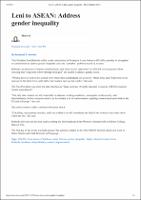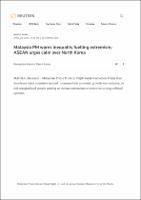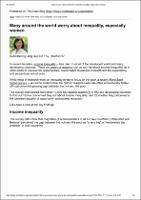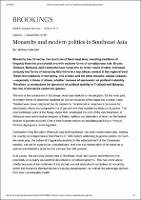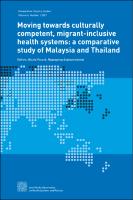Browsing by Title
Now showing items 171-190 of 299
-
Learning from pandemic responses: Informing a resilient and equitable health system recovery in Thailand
(2023-01-25)
This article is part of the Research Topic 'Health Systems Recovery in the Context of COVID-19 and Protracted Conflict'. The third quarter of 2022 saw COVID-19 cases and deaths in Thailand reduced significantly, and high levels of COVID-19 vaccine coverage. COVID-19 was declared an "endemic" disease, and economic activities resumed. This paper reviews pre-pandemic health systems capacity and identifies pandemic response strengths, weaknesses and lessons that guided resilient and equitable health system recovery. Robust health systems and adaptive ... -
Legislating for public accountability in universal health coverage, Thailand
(2019-12-04)
Sustaining universal health coverage requires robust active public participation in policy formation and governance. Thailand’s universal coverage scheme was implemented nationwide in 2002, allowing Thailand to achieve full population coverage through three public health insurance schemes and to demonstrate improved health outcomes. Although Thailand’s position on the World Bank worldwide governance indicators has deteriorated since 1996, provisions for voice and accountability were embedded in the legislation and design of the universal coverage ... -
Leni to ASEAN: Address gender inequality
(Manila Bulletin News, 2017-11-07) -
Lessons from 20 Years of Capacity Building for Health Systems Thinking
(2016-05-20)
In 2016, the Flagship Program for improving health systems performance and equity, a partnership for leadership development between the World Bank and the Harvard T.H. Chan School of Public Health and other institutions, celebrates 20 years of achievement. Set up at a time when development assistance for health was growing exponentially, the Flagship Program sought to bring systems thinking to efforts at health sector strengthening and reform. Capacity-building and knowledge transfer mechanisms are relatively easy to begin but hard to sustain, ... -
Lessons from India and Thailand for Cambodia's Future Implementation of the TRIPS Agreement for Pharmaceutical Patents
(2023-03-07)
Cambodia is expected to graduate from least developed country (LDC) status in the near future, at which time it will be required to make patents available for pharmaceutical products and processes to meet its obligations under the Agreement on Trade Related Aspects of Intellectual Property Rights (TRIPS). Given its impending transition from LDC status, there is a need to balance Cambodia's intellectual property (IP) policies and regulations with public health priorities to ensure access to affordable life‐saving medicines. This will be critical ... -
Low physical activity is associated with adverse health outcome and higher costs in Indonesia: A national panel study
(2022-12-16)
Aims: To assess the association between low physical activity, cardiovascular disease (CVD) and risk factors, health service utilization, risk of catastrophic health expenditure, and work productivity in Indonesia. Methods: In this population-based, panel data analysis, we used data from two waves of the Indonesian Family Life Survey (IFLS) for 2007/2008 and 2014/2015. Respondents aged 40–80 years who participated in both waves were included in this study (n = 5,936). Physical activity was assessed using the International Physical Activity ... -
Making free public healthcare attractive: optimizing health equity funds in Cambodia
(2018-06-25)
Background: Following the introduction of user fees in Cambodia, Health Equity Funds (HEF) were developed to enable poor people access to public health services by paying public health providers on their behalf, including non-medical costs for hospitalised beneficiaries (HEFB). The national scheme covers 3.1 million pre-identified HEFB. Uptake of benefits, however, has been mixed and a substantial proportion of poor people still initiate care at private facilities where they incur considerable out-of-pocket costs. We examine the benefits of ... -
Malaysia PM warns inequality fuelling extremism; ASEAN urges calm over North Korea
(Reuter, 2017-04-28) -
Many around the world worry about inequality, especially women
(World Bank Blog, 2017) -
Measuring health equity in the ASEAN region: conceptual framework and assessment of data availability
(2023-12-05)
Background: Existing research on health equity falls short of identifying a comprehensive set of indicators for measurement across health systems. Health systems in the ASEAN region, in particular, lack a standardised framework to assess health equity. This paper proposes a comprehensive framework to measure health equity in the ASEAN region and highlights current gaps in data availability according to its indicator components. Methods: A comprehensive literature review was undertaken to map out a core set of indicators to evaluate health ... -
Medical costs and out-of-pocket expenditures associated with multimorbidity in China: quantile regression analysis
(2021-02-25)
Objective: Multimorbidity is a growing challenge in low-income and middle-income countries. This study investigates the effects of multimorbidity on annual medical costs and the out-of-pocket expenditures (OOPEs) along the cost distribution. Methods: Data from the nationally representative China Health and Retirement Longitudinal Study (CHARLS 2015), including 10 592 participants aged ≥45 years and 15 physical and mental chronic diseases, were used for this nationally representative cross-sectional study. Quantile multivariable regressions ... -
Mental health literacy amongst children with common mental health problems and their parents in Java, Indonesia: a qualitative study
(2022-02-21)
Background: Optimising mental health literacy (MHL) at the individual and population level can be an effective mental health improvement and prevention tool. However, concepts of MHL are largely based on evidence from high-income countries. Little is known about the manifestation and role of MHL in countries where collectivist health and social cultures are dominant. Aim: This study aimed to examine the MHL of Indonesian children and young people (CYP) with experience of common mental health problems and their parents. Methods: Semi-structured ... -
Migrant Women’s Access to Sexual and Reproductive Health Services in Malaysia: A Qualitative Study
(2020-07-26)
Abstract Providing sexual and reproductive health (SRH) services to migrant workers is key to fulfilling sustainable developmental goals. This study aims to explore key informants’ views on the provision of SRH services for migrant women in Malaysia, exploring the provision of SRH education, contraception, abortion, antenatal and delivery, as well as the management of gender-based violence. In-depth interviews of 44 stakeholders were conducted from July 2018 to July 2019. Data were thematically analysed. Migrant workers that fall pregnant are ... -
Mitigating the impacts of the COVID-19 pandemic on vulnerable populations: Lessons for improving health and social equity
(2023-06-02)
The COVID-19 pandemic had an inequitable and disproportionate impact on vulnerable populations, reversing decades of progress toward healthy populations and poverty alleviation. This study examines various programmatic tools and policy measures used by governments to support vulnerable populations during the pandemic. A comparative case study of 15 countries representing all World Health Organization's regions offers a comprehensive picture of countries with varying income statuses, health system arrangements and COVID-19 public health measures. ... -
Monarchy and modern politics in Southeast Asia
(Brooking Institution, 2015) -
Moving towards culturally competent health systems for migrants? Applying systems thinking in a qualitative study in Malaysia and Thailand
(2020-04-06)
Cultural competency describes interventions that aim to improve accessibility and effectiveness of health services for people from ethnic minority backgrounds. Interventions include interpreter services, migrant peer educators and health worker training to provide culturally competent care. Very few studies have focussed on cultural competency for migrant service use in Low- and Middle-Income Countries (LMIC). Migrants and refugees in Thailand and Malaysia report difficulties in accessing health systems and discrimination by service providers. ... -
Moving towards culturally competent, migrant-inclusive health systems: a comparative study of Malaysia and Thailand
(the Asia Pacific Observatory on Health Systems and Policies, 2021)
Migrants are seldom included in policy discussions on the provision of health care, and in country policy reforms towards health for all. In addition, evidence on health care for migrant populations to inform and guide policy makers is limited. This Comparative Country Study (CCS) uses mixed-method approaches to analyse the extent to which two middle-income countries – Thailand and Malaysia, have culturally competent, migrant-inclusive health systems. The countries have taken different approaches to developing a migrant-inclusive health system. ...




